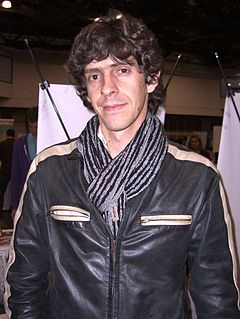A Quote by Carlos Ruiz Zafon
I looked up towards the immensity of the labyrinth. "How does one choose a single book among so many?" Isaac shrugged his shoulders. 'Some like to believe it's the book that chooses the person...destiny, in other words.
Related Quotes
I'm still happy with the way Einstein's Dreams came out. That book came out of a single inspiration. I really felt like I was not creating the words, that I was hearing the words. That someone else was speaking the words to me and I was just writing them down. It was a very strange experience. That can happen with a short book. I don't think it could happen with a long book.
How will I ever get out of this labyrinth!" In reality, "How will I ever get out of this labyrinth!" were probably not Simon Bolivar's last words (although he did, historically, say them). His last words may have been "Jose! Bring the luggage. They do not want us here." The significant source for "How will I ever get out of this labyrinth!" is also Alaska's source, Gabriel Garcia Marquez's The General in his Labyrinth.
It is axiomatic among writers that no one ever sues the writer of an unsuccessful book. Just let a book go over twenty-five thousand copies and it is surprising how many people's feelings are hurt, how many screwballs think their brain children have been stolen, and how many people feel that they have been portrayed in a manner calculated to bring infamy upon them.
After all, if you believe that no one was ever corrupted by a book, you also have to believe that no one was ever improved by a book (or a play or a movie). You have to believe, in other words, that all art is morally trivial and that, consequently, all education is morally irrelevant. No one, not even a university professor, really believes that.
Book ideas are like planes, lined up to approach the runway. Some never leave the gate, but others move quickly to the front of the line. It was like that with The Four Purposes. Honestly, I cannot remember the moment I had the idea for the book; perhaps because it emerged like a green shoot emerging from the soil of my subconscious. But it seemed important enough to begin the flow of words that eventually shaped themselves into this new book.
It's not about you, it's about the next person. The single best use of a business book is to help someone else. Sharing what you read, handing the book to a person who needs it... pushing those around you to get in sync and to take action-that's the main reason it's a book, not a video or a seminar. A book is a souvenir and a container and a motivator and an easily leveraged tool. Hoarding books makes them worth less, not more.
Each of us chooses the tone for telling his or her own story. I would like to choose the durable clarity of a platinum print, but nothing in my destiny possesses the luminosity. I live among diffuse shadings, veiled mysteries, uncertainties; the tone of telling my life is closer to that of a portrait in sepia.
After I had my son I looked everywhere for a book that might serve as some kind of mirror. I bought so many silly books. Now I see what the problem was: I wanted a book about time-about mortality. I can't think of a writer who is at once so experimentally daring and so rigorously uncompromising as Sarah Manguso. Ongoingness is an incredibly elegant, wise book, and I loved it.
I love books, by the way, way more than movies. Movies tell you what to think. A good book lets you choose a few thoughts for yourself. Movies show you the pink house. A good book tells you there's a pink house and lets you paint some of the finishing touches, maybe choose the roof style,park your own car out front. My imagination has always topped anything a movie could come up with. Case in point, those darned Harry Potter movies. That was so not what that part-Veela-chick, Fleur Delacour, looked like.






































